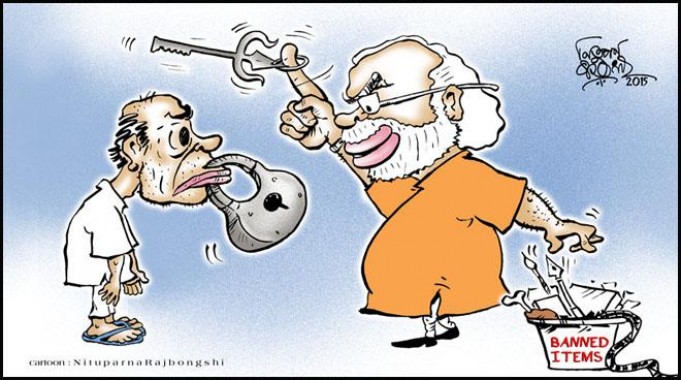Free speech in India, 2015
Introduction
2015 was a hugely eventful year for free speech in India. There were legal, political and technological developments that set the tone for these issues to be debated all year round. And journalists were at their most vulnerable, with deaths, attacks, threats, sedition and defamation cases against them at an all-time high.
This report presents:
- The year’s leading challengers of free speech
- A statistical summation of free speech violations, 2015
- A calendar of stand-out events related to free speech
- A short summary of important developments in the following categories:
Free speech and the judiciary
Government actions in the realm of free speech
Free speech and the political class
Free speech in the online and mobile realm
THE YEAR’S LEADING CHALLENGERS TO MEDIA FREEDOM
We begin by listing those politicians and government organizations who deserve recognition for the challenge they posed to media freedom in this country.
The top ranks go to these four:
- Chief minister J. Jayalalithaa and the Tamil Nadu government
- The Government and the Ministry of Information and Broadcasting
- The Central Board of Film Certification
- The Chhattisgarh state government
CM Jayalalithaa and the Tamil Nadu Government
When the Chennai floods brought journalists from other parts of the country to Tamil Nadu, they noticed that questions about fixing blame were neither asked by the press in Tamil Nadu, nor answered by officials at press conferences. It was an indicator of the defamation capital that this city has become.
In 2015 the chief minister, her ministers, and her government filed a large number of criminal defamation cases against a range of magazines and individuals, prompting the Supreme Court to take note by the year end. The apex court said that the bulk of defamation cases against political leaders has been filed in Tamil Nadu, and slammed the state government for granting sanction for prosecution in these cases.
In May the Supreme Court gave omnibus relief to the magazine Nakkeeranin connection with a set of 15 criminal defamation proceedings initiated against it by the chief minister, ministers and senior IAS officers in Tamil Nadu. These 15 complaints cited all its 20 reporters as respondents.
In November, criticism of government in action led the City Public Prosecutor M.L.Jegan to file a criminal defamation case against the weekly magazine Ananda Vikatan for ‘maligning’ the Tamil Nadu Chief Minister because an article had asked what Jayalalithaa had done so far.
In this report’s total count of 48 defamation cases in 2015, the Tamil Nadu government accounts for 11 of them and for two of the 14 sedition cases filed in the country. In December 2015 the Telegraph reported that the Jayalalithaa government has filed a total of 190 defamation cases during it tenure.
The Government of India and the Ministry of Information & Broadcasting
The I& B ministry under the Bharatiya Janata Party government has become an image manager for its leaders and a censor rather than a provider of information. Its brief now is to safeguard the PM’s image. A few days ago, the Hindu reported that the Ministry will also monitor footage showing the I&B Minister and the Minister for I&B State, in what is an unprecedented move.
In 2015 Sathiyam TV, a Chennai-based Tamil language news and current affairs channel, received a show cause notice alleging that two of their broadcasts had portrayed Narendra Modi in a poor light. In the course of the year, the government issued an advisory to news channels not to telecast the Nirbhaya documentary and served a legal notice to the BBC for airing the Nirbhaya film 'India's Daughter'. It also focused its energies on preventing information leaks to the media and defended its curbs on journalists.
In the course of the year, three channels were issued show cause notices on why they should not face action for YakubMemon’s execution coverage. Among other actions, the I&B Ministry banned a documentary on beef and issued a notice to a Gujarat channel for 'sullying' the image of the prime minister.
Following the extended resistance of the students of the Film and Television Institute of India to the appointment of a director at the International Film Festival of India later in the year, the Ministry decided to drop the student film section at the festival.
The Central Board of Film Certification
This government body acquired a new head early in the year, Pahlaj Nihalani, who remained in the news all year round. The body he headed censored some 21 films in the course of the year, one of which came in for 218 cuts. The CBFC made the most news at the end of the year for shortening the duration of a James Bond kiss. Consequently, on the first day of 2016 the government announced a 6-member panel to review the functioning of the CBFC.
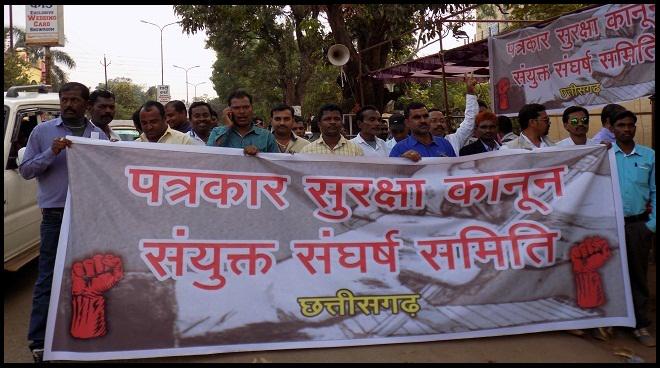
Journalists in Jagdalpur, Bastar district, protest against the continued detention of journalists Somaru Nag and Santosh Yadav on December 22.
The Chhattisgarh Government
It jailed two journalists and presided over the state harassment of journalists in the Bastar region, which led them to hold a protest in Jagdalpur at the end of the year.
A statistical summation of free speech violations, 2015
|
Category |
Number of Cases |
|
|
Deaths |
10 |
8 (Journalists), 2(Intellectuals) |
|
Attacks |
30 |
|
|
Arrests |
3 |
|
|
Threats |
27 |
|
|
Sedition |
14 |
35(people charged with sedition) |
|
Defamation |
48 |
|
|
Censorship of film |
21 |
|
|
Censorship of broadcast media |
4 |
|
|
Censorship of print media |
3 |
|
|
Censorship of Music |
2 |
|
|
Censorship of Cyber Media |
13 |
|
|
Hate speech |
13 |
These figures are based on incidents reported in the press and should be treated as conservative estimates. The figures on attacks against journalists collected by the National Crime Records Bureau are not available yet for 2015. The figures for deaths include those cases in which investigations are not complete.
Free speech violations, 2015, statewise figures
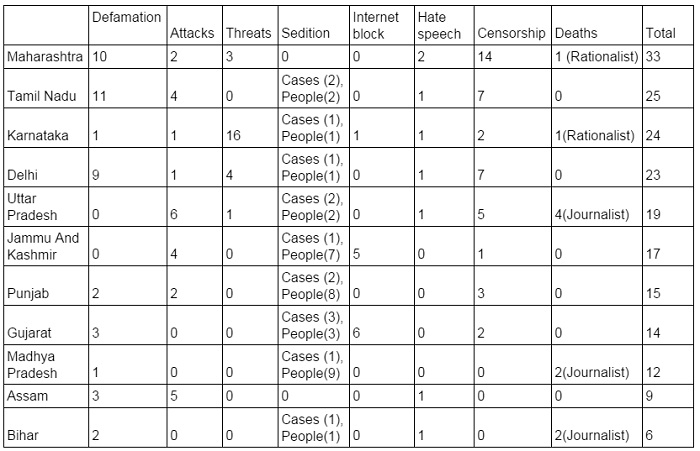
For cases and their details see here
A 2015 FREE SPEECH CALENDAR
January
Jan 4: Attack on G Stephen Babu, Editor of Crime Today at Vinukonda in Guntur district.
Jan 14 : Tamil writer Perumal Murugan announces his ‘death’ as a writer on his Facebook page, after being hounded by caste-based groups and Hindutva forces in Tiruchengode, Tamil Nadu, for his novel Madhorubhagan
Jan 16: Leela Samson resigns as Chairperson of the Central Board of Film Certification, reportedly over ‘interference, coercion and corruption of panel members and officers of the organisation who are appointed by the ministry.’ Nine members resign a day later in support.
Jan 28: Shirin Dalvi, editor of Mumbai-based newspaper Avadhnama, is arrested for reproducing the cover of Charlie Hebdo magazine.
February
February 2: A police complaint is lodged against the organizers of the comedy group All India Bakchod by the Brahman Ekta Seva Sanstha for alleged abusive language in a roast that was organized in Mumbai on Dec 20, 2014.
February 2: Members of the Kongu Vellalr community abduct and thrash Tamil writer ‘Puliyur’ Murugesan for allegedly portraying the women of their community in a bad light in his compendium of short stories.
February 11: Penguin India agrees to withdraw and pulp all unsold copies of American scholar Wendy Doniger's 'The Hindus: An Alternative History' after a protracted legal battle with Hindutva organization Shiksha Bachao Andolan ends in a settlement.
February 21: Senior Communist leader, rationalist and writer of the popular book ‘Shivajikonhota’, Govind Pansare is shot by two persons on February 16 when out on a morning walk with his wife. He succumbs to his injuries five days later.
March
March 5: The Indian government imposes a blanket ban on the screening of a controversial documentary ‘India’s daughter’ on the Delhi gang rape incident as it carried an interview of one of the convicted persons.
March 9: Nagaland government blocks the Internet and mobile data services and bans the circulation of videos and photographs of the lynching of Syed Sarif alias Farid Khan by a huge mob.
March 18: Mere criticism is not seditious, rules the Bombay High Court upholding a petition that challenged the charge of sedition against cartoonist Aseem Trivedi.
March 24: In a landmark judgement, the Supreme Court of India strikes down Sec 66 A of the amended Information Technology Act, 2000 as ‘unconstitutional’.
April
April 8: The Supreme Court seeks the government’s view on the decriminalizing of defamation, while hearing a batch of petitions led by BJP MP Subramanian Swamy challenging the constitutional validity of defamation.
April 13: More than one lakh people from all walks of life send in their recommendations to save the principle of net neutrality following TRAI recommendations on OTT services and online media.
April 28: The Shiv Sena moves a privilege motion against writer and columnist Shobhaa De for her tweets allegedly insulting Maharashtrian culture.
May
May 14: The Supreme Court upholds the framing of obscenity charges against poet Vasant Dattatreya Gurjar for his poem on Gandhi.
May 29: The Meghalaya High Court imposes a ban on media coverage of bandh calls issued by insurgency groups.
June
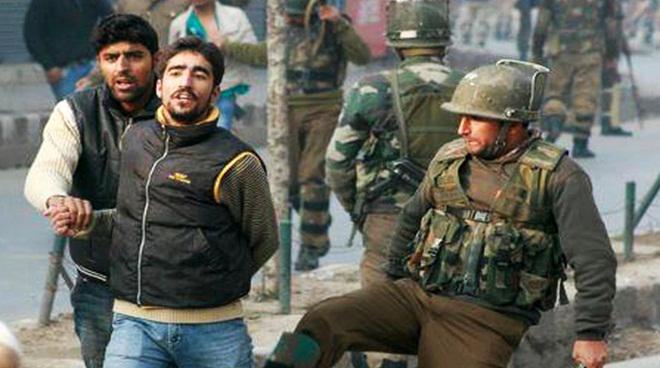
Photojournalist Shahid Tantray thrashed in Nowhatta by police personnel. Photo credit: Mukhtar Ahmad
June 6: Bilal Bahadur, photo editor of Kashmir Life, is attacked and severely beaten by a mob in Srinagar, incensed at coverage of their Friday protests in the Nowhatta area.
June 7: The Ministry of Home Affairs denies security clearance to Sun TV for 33 TV channels which could lead to their shut down. Pending criminal cases against the company’s owners is cited as the reason.
June 8: Shajahanpur-based journalist Jagendra Singh dies of burn injuries, eight days after he alleged in a video that he was set on fire by a group of police and supporters of Uttar Pradesh Minister for Dairy Development, Ram Murti Verma.
June 12: Kanpur-based journalist Deepak Mishra is shot at by unidentified persons. He says the attack was after he wrote a series of articles on gambling dens in a small newspaper Dainik Mera Sach, but police say it because of a personal dispute with a neighbour.
June 15: Haider Khan, a journalist in Uttar Pradesh's Pilibhit district, is brutally assaulted, tied to a motorcycle and dragged on the ground, allegedly for his reports on dubious land deals.
June 22: Sandeep Kothari, a 40-year-old journalist based in Jabalpur, is allegedly kidnapped from Balagat in Madhya Pradesh and set on fire. He dies later. He had written against the illegal mining mafia and was being pressurized to withdraw a case he had filed on this topic.
June 23: BJP leader Subramanian Swamy, who is facing multiple cases in Delhi, Mumbai, Assam, Mohali and Kerala, challenges the hate speech provisions of Sections 153, 153A, 153B, 295, 295A, 298 and 505 of the Indian Penal Code as violative of his freedom of speech.
July
July 5: Akshay Singh, a reporter with Aaj Tak channel, who was covering the Vyapam scam in Madhya Pradesh, dies in mysterious circumstances in Meghnagar near Jhabua, minutes after interviewing the father of Namrata Damor, a student whose body was found near a railway track in Ujjain district of the state. At least 23 people had died an unnatural death, according to a special investigative team probing the scam.
August
August 8: Raja Chaturvedi, a journalist working in Kannauj district in Uttar Pradesh, is shot dead just outside his house by unidentified persons.
August 8: Sanjay Pathak, a stringer with a local Hindi newspaper, in Uttar Pradesh’s Bareilly district, is killed by two persons in Faridpur area in the district.
August 27: A Rs 250-crore defamation case is filed by Essar Steel against Caravan magazine.
August 27: The Maharashtra government issues a circular to all police stations directing that sedition charges be applied if citizens criticize public officials or politicians.
August 30: Former Vice Chancellor of Hampi University, rationalist and well known Kannada writer MM Kalburgi, is shot dead in his residence. He was attacked for his views against idolatary in a campaign of the Vishwa Hindu Parishad.
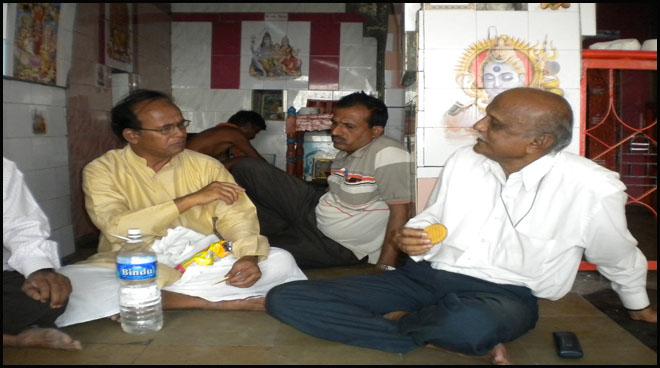
Prof Kalburgi and Linganna Satyampet (in yellow) in a discussion, Shahapur, 2010
September
September 2: The Internet is blocked in Manipur indefinitely after an outbreak of violence in Churachandpur
September 4: Hindu groups force literary critic M M Basheer to stop writing a regular column on the Ramayana for the Malayalam daily Mathrubhumi.
September 9: The Gujarat High Court upholds a ban on internet services during the Patel agitation in Gujarat.
September 24: Internet services are suspended in Jammu and Kashmir to ‘stop miscreants from posting objectionable pictures’ of beef slaughter during the Eid festival. The ban on internet services was re-imposed in November for the visit of Prime Minister NarendraModi.
September 30: Freelance journalist Ajay Vidrohi is shot dead in Sitamarhi, days before the Bihar state elections.
October
October 10: Hemant Yadav, a journalist with a local news channel, is shot dead by motorcycle-borne gunmen in Chandauli district in Uttar Pradesh.
October 10: Sudheendra Kulkarni, who heads the Observer Research Foundation, is attacked by Shiv Sena party members and his face blackened with ink for organizing a book launch of former Pakistan foreign minister Khurshid Mahmud Kasuri.
October 27: Mithilesh Pandey, a reporter with Dainik Jagran is shot dead in his house in Khastha village in Gaya district of Bihar.
October 7: Acclaimed writer Nayantara Sahgal and poet Ashok Vajpayi return their Sahitya Akademi awards to protest the threats to free speech and intolerance in the wake of the killing of Professor Kalburgi and the Dadri lynching of Mohammed Akhlaq and are followed suit by a number of eminent writers, film-makers and poets. Eminent writer Uday Prakash had returned his award in September.
October 7: Two concerts of Pakistani ghazal singer Ghulam Ali in Mumbai and Pune in Maharashtra are cancelled following protests by the Shiv Sena which is opposed to all ‘cultural ties’ with Pakistan.
October 9: The Delhi High Court seeks the CBFC’s response to a petition on the denial of a certificate for ‘En Dino Muzaffarnagar’, a documentary on the Muzaffarnagar riots made by the late Shubradeep Chakravorty and Meera Chaudhary. The film was to be granted an ‘A’ certificate.
October 10: Adivasi journalist Someru Nag and Hindi media reporter Santosh Yadav are arrested by Chhattisgarh police on suspicion of supporting Maoists. Despite protests by local journalists and a signature campaign by academics and activists across India appealing for their release, the duo are still in jail.
October 12: Indo-Pak band Mekaal Hasan Band is not allowed to perform in Ahmedabad’s Sheth CN College of Fine Arts after a scheduled concert was disallowed by the college trustees in the wake of a protest by the Shiv Sena.
October 31: Tamil folk singer S Kovan is slapped with a sedition case for singing songs critical of Tamil Nadu Chief Minister J Jayalalithaa and her liquor policy. Kovan heads the Makkal Kalai Ilakkiya Kazhagam or People’s Art and Literary Association, a 30-year old cultural organization that stages plays on social issues.
November
Nov 19: The Director of Film Festivals drops the entire students’ section from the IFFI fearing trouble from students of the FTII who have been protesting over the lack of transparency in appointments to the Governing Council. A 139-day strike by the students over the appointment of Gajendra Chauhan and four others ends inconclusively.
Nov 20: The CBFC cuts four scenes from ‘Spectre’, the James Bond film, two for alleged profanity and two for ‘excessive kissing’.
Nov 23: Newspapers in Nagaland carry blank editorials to register their misgivings at the directive of the Assam Rifles that they should not cover banned groups
December
December 1: Several offices of the Marathi daily Lokmata reattacked for publishing an allegedly blasphemous cartoon depicting ISIS funding in an article titled 'ISIS cha Paisa' (ISIS' money).
Dec 9: Mohammed Wasim-ul-Haq, the chief editor of Akhbar-e-Mashriq, an Urdu daily from Kolkata, is taken into preventive custody by police in Delhi for an article critical of the provocative statements of a Hindu leader.
Dec 10: The Tamil Nadu government files sedition charges against a Tamil news weekly 'Namadhu Manasatchi' for allegedly publishing a false and seditious report on public healthcare.
Dec 10: Tamil Nadu Handloom and Textile Minister S. Gokula Indira files a criminal defamation case against Tamil weekly Ananda Vikatan for publishing an article criticizing the ministry.
Dec 16: Ravi Shankar Prasad, Minister of Communications, informs Parliament that the Government has blocked 844 social media pages till November under the IT Act.
Dec 17: Newspapers in Imphal shut down for a day following a bomb threat to the editor-in-chief of Impact TV.
Dec 21: The Rajasthan government blocks Internet services in some districts indefinitely after communal clashes in the districts of Nagaur, Dungarpur, Udaipur, Bhilwara and other parts of the state.
Dec 26: As part of the ongoing controversy over alleged corruption in the Delhi and District Cricket Association, Tejbir Singh, father of Delhi cricketer Himmat Singh, files a defamation suit against suspended BJP leader Kirti Azad, and former cricketers Bishan Singh Bedi and Surender Khanna.
Dec 26: A petition is filed in the Madras High Court by Paneerselvi, seeking an interim stay on the release of Ram Gopal Verma’s film ‘Killing Veerappan’ because the “entire movie is filled up with false information which is nothing but creating law and order problems in Tamil Nadu."
Dec 27: Kerala photographer Rafeeque Taliparamba’s studio is burnt down after he questioned certain Islamic practices including the tradition of purdah on a WhatsApp group.
Dec 30: The Delhi and District Cricket Association files a defamation case against Delhi Chief Minister Arvind Kejriwal and suspended BJP leader Kirti Azad for their “wild and baseless” allegations of corruption against the cricket body.
Dec 31: Desiya Murpokku Dravida Kazhagam (DMDK) chief and Tamil film actor Vijayakanth spits at journalists and dares them to ask Chief Minister J. Jayalalithaa similar questions about the upcoming assembly elections.
Sectorwise developments
FREE SPEECH AND THE JUDICIARY
The year saw a number of legal developments with implications for free speech. The most significant of these came in the first quarter of the year.
On March 24 the Supreme Court Justices J Chelameswar and R F Nariman struck down Section 66A of the Information Technology Act, 2000 (which criminalized annoying, menacing and offensive speech), along with Section 118(d) of the Kerala Police Act (which criminalized annoying speech) for violating the fundamental right to free speech enshrined in Article 19(1)(a) of the Constitution. Section 79 of the IT Act which immunizes intermediaries from liability was held valid by the Court subject to certain conditions. Only Section 69A of the IT Act, which allows the government to block websites, on certain limited grounds, was held entirely constitutional by the Court.
See analysis here: A blow for free speech
Several cases of defamation and sedition as well as several media related cases went up to the apex court in the course of year. Most of the time, it weighed in on the side of the freedom of speech of the accused.
The SC dismisses a Tamil Nadu government petition charging folk singer Kovan with sedition.
It extends the stay on defamation proceedings against DMKD leader Vijayakanth by the Tamil Nadu government.
The apex court pulls up the state government for filing so many defamation cases.
It also steps in to protect journalists from similar actions by the Delhi Government
The Supreme Court stays a Delhi government circular on defamation
The Supreme Court stays defamation proceedings filed against journalists and publishers in older cases.
It stays defamation proceedings against Rajdeep Sardesai and seven others.
It also stays proceedings against AroonPurie.
In a case of defamation being filed against publications and writers, the Supreme Court declines to transfer a defamation suit against Caravan by EssartoDelhi.
But in the case of the Indian Institute of Planning and Management, the Court calls the institute’s Rs 50 crore suit against Caravan bogus and lets the case be transferred to Delhi.
In June, the Supreme Court has to step into the case of the Union Home Ministry denying security clearance to Sun TV on account of criminal cases pending against them. It stays the Tamil Nadu High Court order cancelling Former Union Telecom Minister Dayanidhi Maran’sbail.
No security clearance for Sun TV: Home Ministry
SC smells `political vendetta' against Maran, stays arrest
SC stays till September 14 a HC order cancelling Maran's bail
In 2015, the Law Commission recommended doing away with the death penalty for all offences except terrorism and sedition. But sedition became such a frequently imposed charge that the prospect of such a recommendation is worrying. There were 26 cases that we captured from media reports but the number could be larger.
But in the case of Hardik Patel and the charge of sedition levied against him by the Gujarat government, there were several successive developments with the Supreme Court initially refusing to quash sedition charges against him, and then transferring his plea against the sedition charge to another bench in November.
In terms of restraining the media in 2015, the Supreme Court observed in August that the government should regulate social media to curb malicious campaigns.
SC calls for new law to regulate social media
GOVERNMENT ACTIONS IN THE REALM OF FREE SPEECH
Between the Central Board of Film Certification, the Ministry of Information & Broadcasting and the Ministry of Home Affairs, a hyperactive government did more than its share of censorship and policing.
These are the instances we recorded stretching across the categories defined in the opening table of this report.
Stand on ‘kiss’ proves costly for CBFC officer?
What the CBFC Didn’t Want You to Hear in ‘Angry Indian Goddesses’
Kerala government puts curbs on staff’s creative works, then does a rethink
Modi critic removed from cultural panel
In India, James Bond has only half a licence to kiss
Facebook reports surge in government requests for data
I&B Ministry appoints four new censor board members, two with BJP links
I&B Ministry now bans documentary on beef
Pakistani author denied Indian visa for literary festival
Government blocks pro-IS websites
Centre to ask social media companies to block sensitive posts
For media monitor, work is counting PM, Ministers on TV
I&B notice to Gujarat channel for 'sullying' image of Modi
Censor okays, then blocks film on assassins of General A S Vaidya
Censor Board to vet film glorifying Khalistan cause
Sathiyam TV moves Delhi HC against I&B Ministry order
Sunni outfit calls for ban on Iranian film depicting the Prophet Mohammad
Censor Board refuses to clear documentary on Modi-Kejriwal’s 2014 Varanasi battle
With 72 cases, Kerala records highest ‘offences against State’, Assam 2nd: NCRB data -
I&B officials head to FTII as students up the ante
Government defends curbs on journalists
Explain why you shouldn’t face action for Yakub’s execution coverage: Government notice to three channels
Define contours of right to privacy, Centre tells Supreme Court
Porn ban: Why India’s order to block 857 websites might not work
Ban only on sites promoting child porn, says Centre
Number of ‘adult’ films trimmed for TV rising
NIA special cell to monitor terror chatter on the internet?
Censor Board Decides To Withdraw Controversial List Of Cuss Words
Government blocks 40 websites citing religious intolerance
Home Ministry denies security clearance to Sun TV
Intelligence Bureau red-flags a Punjabi movie ‘Jinda and Sukha’ based on A S Vaidya killers
Government serves legal notice to the BBC for airing Nirbhaya film 'India's Daughter'; Congress and BJP spar
Government unblocks 32 websites as they promise to cooperate
Government plans fresh policy to prevent info leaks to media
Directives to television channels
I&B Ministry's advisory to news channels to not telecast the Nirbhaya documentary
FREE SPEECH AND THE POLITICAL CLASS
Between filing defamation cases against each other and the media, and indulging in hate speech, the political class contributed its share to the longlist of free speech violations in 2015.
The numbers of incidents in specific categories are in the opening table of this report.
Congress politician sues Kannada channel for Rs 100 crore in defamation case
Sadhvi Balika Saraswati Booked for Hate Speech
Rahul Gandhi moves SC for decriminalizing defamation law
Chandrababu supporters file defamation case against KCR in AP
Police refuse to file hate speech FIR against TMC leader Abhishek Banerjee
Hate speech charge sheets filed against Anubrata Mondaland Dudhkumar Mondal
Guwahti High Court gives respite to BJP leader Subramanian Swamy in hate speech on Ayodhya row at a function organized at Kaziranga University on March 15.
BJP legislator T Raja Singh of Goa denies charges of making a provocative speech aimed at fomenting communal tension.
Charges framed against Himachal Pradesh CM Virbhadra Singh in defamation case
Geelani ‘Seditious’ Letter To Nawaz Sharif Proves That India Can Never Trust Hurriyat
Jayalalithaa files defamation case against Nakkeeran
Muslims have a Pakistan, you don't, Sena tells Jains
Jhabua Explosion: Defamation Case Against MP Congress Chief
Trinamool Congress MP Abhishek Banerjee files defamation suit againstWest Bengal Left Front chairman Biman Bose
Gujarat police book Patidar leader under sedition charges
Notice to Ramesh in defamation plea filed by Dhumal
Defamation notice to two Chhattisgarh ministers
Tamil folk singer charged with sedition for anti-Jayalalithaa songs
FIR against Akbaruddin Owaisi for his speech at an election rally in Bihar.
South Africa files defamation suit against Modi
National Herald remark: Congress sends legal notice to Javadekar
Rahul Gandhi refuses in Supreme Court to regret his statement on RSS
Jayalalithaa sues Ananda Vikatan magazine for ‘defamatory’ article
Tamil Nadu Minister files defamation case against Vikatan
Arrest warrant against BJP MP
DEVELOPMENTS IN THE ONLINE AND MOBILE REALM
Reddit to honour 'Do Not Track' requests from visitors to its website
Cybercrime hit half of India’s Net users, says study
Facebook blocks certain news articles; transparency?
US court rules in favor of Facebook, says blocking content is legal
Indian startup Silver Push raises hackles in US over privacy violation
Google defeats most claims in browser tracking lawsuit
Protecting users online: Google, Vodafone top the list
Internet freedom improved in India for the second consecutive year in 2015: Report
Google, WhatsApp Accused Of Breaching Users’ Privacy
Only partly free
India becoming strategic target for cyber-criminals: Report
Indian hackers bring down Pak websites on Independence Day
Facebook cancels internship of Harvard student who exposed Messenger privacy flaw
ISPs seek clarity from government on porn ban
Can't peep into bedrooms to stop porn, AG tells SC
Porn ban: New order vague, cannot be implemented, say ISPs
Some Indian ISPs Seem to Be Blocking Porn Websites
Housing.com site hacked
Anonymous India hack BSNL website, claim to have access to 30 million records
Facebook Global Government Requests Report: Restricted access to 5,832 pieces of content in India
YouTube removes Nirbhaya documentary: TV reports
For previous year's free speech report: click here
